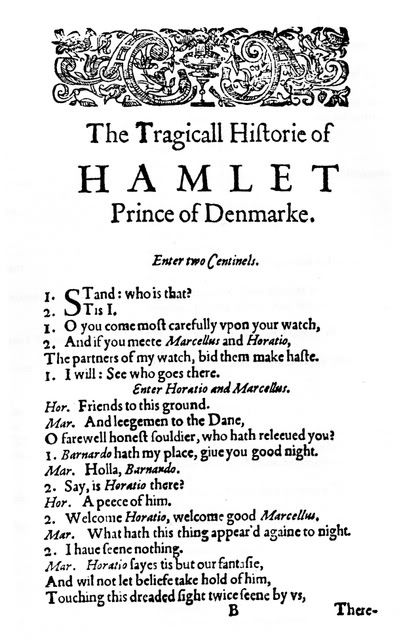
Tom Newman: Hamlet isn't just Hamlet. Oh no, no, no. Oh, no. Hamlet is me. Hamlet is Bosnia. Hamlet is this desk. Hamlet is the air. Hamlet is my grandmother. Hamlet is everything you ever thought about sex, about geology…
Joe Harper: Geology?
Tom Newman: In a very loose sense, or course.
--- from Kenneth Branagh’s In the Bleak Midwinter
I’ve never seen the film in which the above lines are delivered but, out of context, they seem to me to address the greatness of Hamlet. The exchange not only suggests the multiplicity of the play but also the meta-textual arena through which we must experience it. Hamlet isn’t singularly profound according to an “objective” literary valuation --- we make it great (I couldn’t decide whether to italicize “we” or “make” right there). Appreciation of Shakespeare’s writing is often directed (imposed?) by academic context but, better looked into, the apparatus of valuation becomes as complicated and informative as the work (in its “central” position --- though I use the idea of centrality tentatively because the two aspects that perpetuate the text are probably inseparable and centrifugal). As a director I have developed an approach to Hamlet that I’m now applying through performance; I have come to understand that unqualified awe must be eschewed with deconstructive rigor in a movement toward significant awareness of the play. Since actors that I work with tend to be more comfortable with a process reliant on psychological causality and empathy it’s a challenge to expect them to be able to apply conceptualism that dislodges a motivational approach. Example: my sense of the “character” of Hamlet, developed by protracted close readings through various critical lenses, became more of a critique of coherent identity (or a positive recasting of Eliot’s complaints predicated on an attachment to an “objective correlative”) that reinterpreted Hamlet’s conflict as a schizophrenic fragmentation of selves unable to properly conflate within the dramatic context of the play. That’s a terribly devilish, maybe nearly impossible, intellectualization to ask an actor to viscerally express. Yet, according to a formalist reading, performative identity is a major theme. It’s not a matter of striking a balance between the soldier, courtier, and scholar that are remarked to be all in him --- Hamlet must also be an intertextual being; he must somehow also be this desk. One of the many stylistic/thematic choices we’ve made in rehearsals is to represent Yorrick’s skull with a large mirror that Hamlet stands in front of as he recites his famous lines --- upon considering death’s invalidation of personal existence Hamlet is facing not only a reflection of himself but of the entire audience seated behind him. The thematic conflation that constitutes the skull unfolds into a visualized network of meaning that encompasses not just the fictive situation of the drama but also the context of the production itself. This is the most challenging project I have ever attempted in my life. Although I work often as an (autodidactic) director, I am a writer, both by vocation and education, and feel most operational when embracing the gifts of solitude and interiority that practitioners of my craft tend to put to best use. The collaborative plane on which theater occurs messily affronts my abilities of artistic expression in ways both destabilizing and engaging. The writer’s struggle is private and intellectual while the director’s is discursive and interpersonal. In rehearsal the other day I had to instruct an actor how to move as slow as possible across the stage, without ever standing still, while carrying a very heavy and gnarled tree trunk on his back and delivering lines --- the experience, uncannily, felt like a literalized rendition of the introverted endeavor of the writer in a way that used the interactive grammar of performance. The aspect of theater that I most enjoy when I direct is watching and shaping the relational movement of bodies and beings articulating a text in exciting ways. While watching actors find their way through the material and across the stage with each other, when it really works, I sometimes find myself unable to remain still and begin to pace eagerly in the shadows where I attentively observe. Putting on Hamlet is a way of becoming Hamlet; maybe that’s as much a part of the thing as reading it and thinking about it.
(Lonely Christopher, web editor.)
3 comments:
dipset bitch
We provide YouTube associated support, our professional expert team all time available for customer's assistance. If you suffering any kind of issues related to YouTube like YouTube not working your device, How to connect YouTube on Smart TV, how to know activation code, how to connect YouTube on Roku, Xbox, and PS3, etc. Contact us to visit our website on YouTube Activate , we fix your issues as soon as possible and gives a complete solution.
Post a Comment